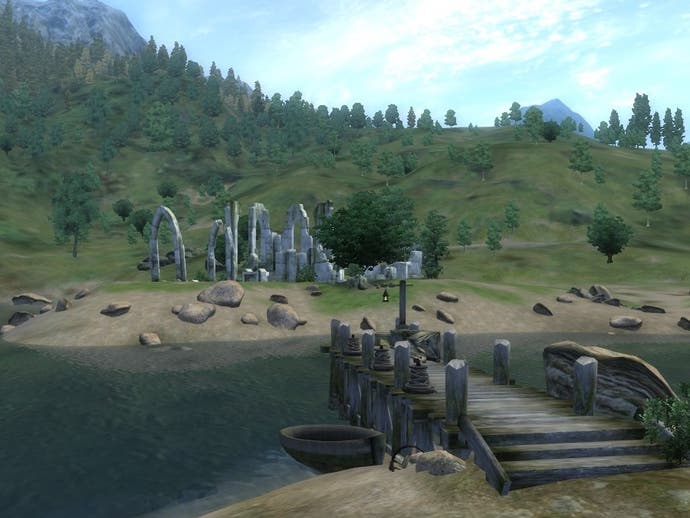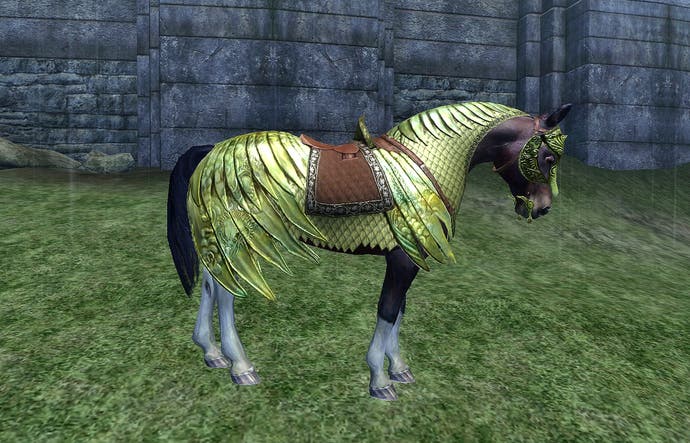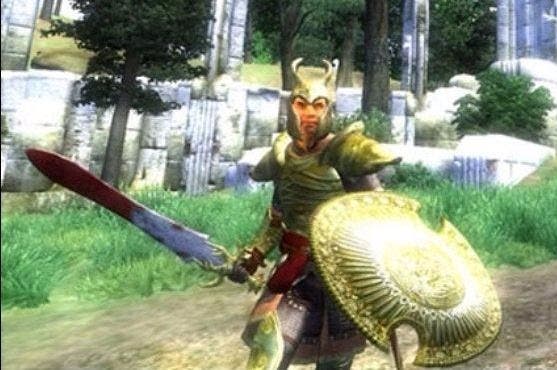Now it's backwards compatible, here are Oblivion's best moments
The elder Elder Scrolls.
The Elder Scrolls 4: Oblivion is now on Xbox One backward compatibility, an excellent excuse to relive its signature moments. And that means even if seeing them demands a considerable investment of time and, depending on your tolerance for bugs that were never squashed, the uncanny valley horrors of its famously potato-faced population, and the sheer early-gen jankiness of it all, sanity. Playing a game from the early days of the 360 is like watching 90s television: you wonder how we ever coped. You can see how we got from there to here, but it's painful to go back.
It is, of course, a game that's all about those signature moments. Right from the start, Oblivion lays some of its most iconic cards on the table. Waking up in a prison shortly after the character creation screen, you encounter Valen Dreth in the cell opposite, a bored Dunmer elf with nothing better to do than taunt you with a torrent of abuse that is tailored to your chosen gender, and whichever one of the ten races you've picked.
After telling you you're definitely going to die in prison (rude), he whispers: "Hey, you hear that? The guards are coming..."
He wasn't lying, the guards were coming. Specifically, the personal guards of the emperor, Uriel Septim the Seventh, sporting James May's "mortgage tosser" haircut and the delectable voice of Patrick Stewart. It turns out that your cell harbours a secret escape route from the Imperial Palace. Fate, it seems, has placed you in Patrick Stewart's path, for he has dreamt about your face. Which is all the more surprising when you consider that you've only just designed it.
After a frantic escape sequence during which you learn that the emperor is fleeing an assassination attempt, and (rather more pertinently) how to kill people, you emerge from the sewers underneath the Imperial Prison to be greeted by, well, the world. This is the quintessential "Oblivion moment", and it has been copied many times since.

It's not much of a view, in retrospect. There's a jetty, a river, some elven ruins and a lot of hills, which tantalise but obscure anything interesting. At this point, it's assumed that the player is asking: "what now?" The game is already replying: "...anything." You can explore those ruins. See what's behind those hills. Follow that river to the edge of the world.
So began millions of adventures in Cyrodiil, the Imperial province of Tamriel, the supreme continental superpower on the planet Nirn. Bethesda had been writing The Elder Scrolls' lore for 12 years by this point, and they'd written a lot. They'd even named the moons. Twice.
But the majority of Oblivion's fans were unaware of Nirn's geopolitical situation, or that its "moons" were in fact visible portions of extra-dimensional God realms, because as far as the public at large was concerned, this was Bethesda's own "big reveal". Long before Skyrim inserted itself into the charts and refused to leave, before Fallout had been renovated from niche turn-based-nerd-thing to action-blockbuster-starring-Liam-Neeson, Bethesda had barely dipped its toes into the mainstream (console) market. 2002's Morrowind enjoyed respectable sales on the original Xbox, but it was still fundamentally a PC experience, with a PC interface and PC sensibilities. Oblivion would come along four years later, designed specifically for the then brand-new Xbox 360. It wasn't quite a launch game, but it's perceived as having kicked off the 360 era, and was described by many as the first "true" next gen experience.
Bethesda had emerged from the sewer. The "Oblivion moment" is one the team would repeat - Fallout's vault concept gifted them the the perfect excuse to do it again, having the player spend the entire prologue inside a city-sized bomb shelter before allowing them a glimpse at the overworld. Skyrim had you leaving a cave after escaping your own execution, to be greeted with misty mountains and a dragon flapping its wings overhead. Fallout 4 did it with an underground lift taking you to the surface, after you'd slept through the violent death of civilisation itself.

Of course, there are plenty more moments in Oblivion after the "Oblivion moment", and they're fondly remembered despite the bulk of the experience (meandering around a bland Tolkienscape and killing things) having been surpassed by dozens of open world games since.
Many will recall the village of Hackdirt with its creepy residents and the awful truth they're desperate to conceal. Or the 'Brush With Death' side quest, in which you save an artist who has been trapped inside his own paintings - where the art style completely changes for the duration. Or being surreptitiously approached by Glarthir the wood elf with the offer of money to investigate his fellow townsfolk, about whom he is having paranoid delusions. They usually end up dead. Or the bit on the boat that's like Under Siege, which was good, particularly if you remember Under Siege.
There are so many "Oblivion moments" that it's impossible to remember one without remembering half-a-dozen more. To see Oblivion at its absolute best, though, one must join The Dark Brotherhood. To talk of Bethesda's greatest hits without mentioning it would be, at best, gross negligence. The first act is a tightly-wound string of Hitman-esque set pieces, shot through with black comedy and Agatha Christie farce. It then changes gears entirely, becoming a conspiracy thriller that leads to a twist so gut-wrenching and brilliantly played that it remains the most legendary reveal in a 100+ hour game that's stuffed to bursting point with reveals.
Yet, despite all that, the core experience is forgettably dull. Quite literally, people tend to forget that it's dull.
When it's good, it's outrageously good, but the rack upon which its triumphs hang can barely support them. Everything from its claymation visuals to its flailing combat has been infinitely bettered in the decade that's passed and, sure, there are few games that can stand the test of that much time, but its underlying ropiness didn't go unnoticed in its heyday. We just tolerated it, because we loved living "another life in another world", as the back of the box promised we could.
Oblivion is a poster child for the phrase "as wide as an ocean, as deep as a puddle", but at its cleverest, at its most inventive, it caused millions to fall in love - not just with itself, but with its formula, one which would be crucial to the success of Bethesda's future releases as people kept coming back for more.
It's not Bethesda's best game, or their smartest, or their most polished, but it was indisputably their Oblivion moment.

